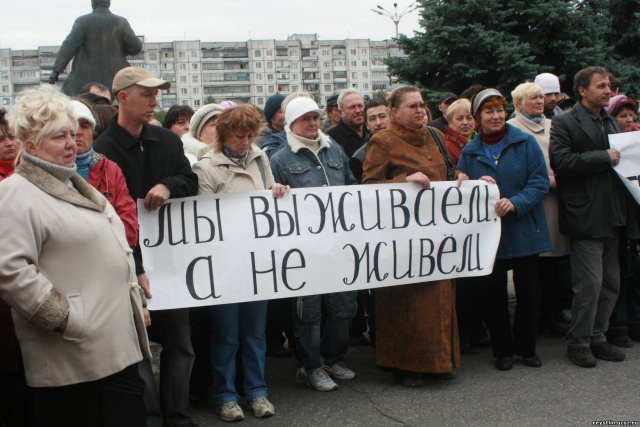The National Research University Higher School of Economics, which is considered a stronghold of liberalism in Russia, asked VCIOM, which can hardly be suspected of sympathy for liberalism, to create a profile of self-awareness of Russian citizens. Sociologists have tried to find out the social status and financial situation of the respondents according to their personal feelings. The poll said that at the moment 41% of Russians feel that they are not very wealthy people, in other words, poor people.
The director of the Center for Political Information, Alexei Mukhin, explained that the percentage of so-called subjective poverty increases by one percent per month. Socially disadvantaged groups, such as pensioners, feel themselves to be very poor. According to the Federal State Statistics Service, their number was 15.7% in the first quarter of 2016, 16.1% in May and already 18.5% in June.
In addition, 10% of the population feel that they are extremely poor. This means that they do not see any development prospects or way out. People start to save money on clothing and food. "Pensioners, the number of which will be about 31 million in Russia in the near future, which is almost a third of the population, are in an extremely difficult situation. Therefore, the authorities will face very serious social tensions in the 2016-2018 election cycle, which will grow from year to year, from month to month," Mukhin believes.
According to him, in these conditions a reduction of healthcare spending and dissent in the pension system will multiply concerns, and there will be complaints not to only the ruling party, but also to the authorities.

The expert offers a close look at the government's social bloc: "The measures, which are now being accepted in the social sphere, are not sufficient. The social bloc's hope that all costs will be covered by the population seems extremely vicious. One can raise taxes, increase indirect taxes and tighten the fiscal system. But this will lead only to the self-closure of the system. Specific measures should include the introduction of much stronger lobbyists to the social bloc than now. A 30 percent drawdown is the result of the poor performance of the lobbying part of the social bloc. It is necessary to qualitatively improve the constructive proposals of new projects, including with the involvement of outside money, not be confined only to the budget process. It is necessary to start a civil discussion, a panel discussion, and uncover the conspiracy of silence of the social bloc, because our social bloc is untouchable. We all understand that it's complicated, there is no money in the budget, the deficit is growing, 3.2 trillion rubles. But we have to discuss it, especially on the eve of the elections."
According to Mukhin, the social bloc should demonstrate goodwill and a desire to receive feedback from society: "Only the alignment of communication with civil society, an expert community, will give a new impetus to the development of the social bloc. If they are closed on themselves, it will not solve the problem."






